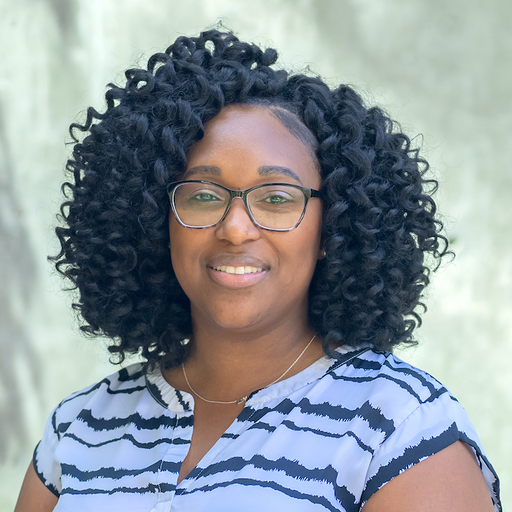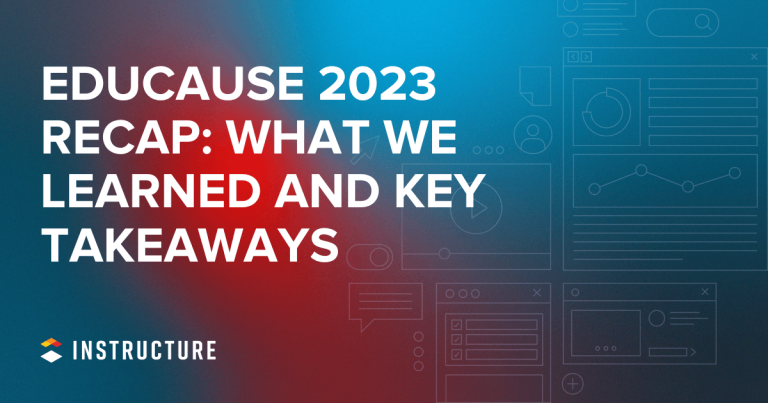Instructure joined thousands of higher education professionals and technology providers from around the world at the 2023 EDUCAUSE Annual Conference in Chicago. At the conference, we connected with our #CanvasFam and community, gleaned best practices from peers and colleagues, and shared insights of our own.
From engaging sessions to captivating keynotes, there was no shortage of opportunities for inspiration, education, networking, and aha moments (or, should we say, “AI” moments). Read on for a recap of our time in the windy city, starting with seven key takeaways.
7 Key Takeaways from Educause 2023:
- Generative AI – with its capabilities and risks – is an undeniable change agent for teaching and learning and requires humanity to inform and drive it.
- The ways in which we access, use, protect and provide data present a growing need for data governance and cybersecurity.
- Students want proof of educational return on investment before making the investment, as well as universal access to learning. Flexibility in how programs and courses are delivered will be paramount for student success.
- Actionable data is a must-have across all facets of higher education to enable more efficient decision-making.
- A growing education landscape calls for intentional efforts to provide equitable access to education, educational technology, and data.
- Today’s “student” cannot be defined in one way. Learners of all generations and backgrounds need to be met where they are if institutions want to be conduits for lifelong learning.
- Institutional agility – especially as it pertains to addressing risk, finance, and student needs – will breed institutional sustainability in the ever-changing world of work.
What We Learned

“AI will do what humans need it to do and not a step further.” – Dr. Tressie McMillan Cottom, Professor, MacArthur Foundation Fellow and New York Times Columnist (2023 EDUCAUSE Keynote)
To address the top themes or takeaways from EDUCAUSE is to first address the elephant in the room: the topic of AI. As many of us expected, generative AI and emerging technology was a hot topic. And for good reason. Regardless of the role one may have in higher education, the sudden popularity of AI and its endless use-cases presents a myriad of opportunities as well as risks to the evolving world of work. It has the potential to revolutionize teaching and learning, as educators and students have begun embracing it inside and outside of the classroom. With such powerful tools at our fingertips, concerns around data ethics, privacy, literacy, and governance have grown immensely. Institutions expressed a need for focus on data fluency to create a more data-informed culture across higher education. While there were multiple takes on what AI will mean for the future of education, one core truth emerged: humanity will be its driving force and will ultimately determine its efficacy. Dr. Tressie McMillan Cottom kicked off EDUCAUSE with a candid keynote emphasizing that even once it has gone through its maturation phase, “AI will do what humans need it to do and not a step further.”

“Valuing data as a strategic asset sounds simple, but it’s so consequential.” – Susan Grajek, Vice President, Partnerships, Communities and Research, EDUCAUSE (2023 EDUCAUSE Keynote)
With so much talk of data came the notion that institutions must know what the data means if they’re going to make meaningful decisions that support institutional sustainability. All facets of the organization (educators, decision-makers, IT professionals, etc.) must understand how to turn data into action. From discovery to decision-making, sessions placed a magnifying glass on the data-gathering process, covering topics such as learning and conversational analytics, and data storytelling. Simply put, institutions can no longer focus on the retrieval of data alone. But, according to Ithaca College, should also consider data governance, culture, analytics & research, data literacy, reporting, technology and people. In the 2024 EDUCAUSE Top 10, resilience across higher education is the theme and data is represented in the first five points, as cybersecurity remains a major institutional risk.

“Recruitment has become an intergenerational sell.” - Kim Lear, Writer, Researcher and Founder of Inlay Insights (2023 EDUCAUSE Keynote)
In a heartfelt, nostalgic and wildly thought-provoking final keynote, Kim Lear walks attendees through several characteristics of people born in four generations: Baby Boomers, Generation X, Millennials and Gen Z. Drawing on the similarities and differences of each generation, she emphasizes that recruitment today is an intergenerational sell, in that students are turning to their parents for advice on job offers or educational investments. While this denotes a need for institutions to consider the questions multiple generations may have regarding a student’s decision to attend a university (or accept a job offer), Kim ended with a more over-arching consideration. Aging is living. Today’s students are not only 18 through 22-year-old high school graduates, but they are learners of all ages and walks of life who expect uninhibited access to education and flexibility in education delivery (i.e. multiple modalities, self-paced courses, skills-based learning and credentials). If higher education wants to support lifelong learning, institutions must enable students to be architects of their own education by meeting them where they are and providing them with universal access to institutional services.
What We Shared
In partnership with Inside Higher Ed, Instructure hosted a Lunch Briefing to reveal key findings from IHE’s newly available 2023 Survey of Campus Chief Technology/Information Officers. Ryan Lufkin, VP of Global Strategy at Instructure, and Doug Lederman, Editor and Co-founder of Inside Higher Ed discussed enrollment and budget challenges, managing EdTech across campuses, keeping up with increasingly tech-savvy students, and workforce needs that may outpace skilled graduates.
When asked, “What are your institution’s biggest challenges when it comes to achieving its digital goals,” the top response was “resistance among staff and faculty.” To which Lederman added, “Change management, even in the face of lots of evidence, can be challenging for many institutional leaders.”
For more takeaways, read our full recap of the lunch briefing.
Instructure wrapped up the conference with a session from Instructure’s Chief Product Officer, Shiren Vijiasingam. In Flexibility for Expansion: Embracing Today’s New-Traditional and Lifelong Learners, Shiren explored the future of education through the lens of learner needs and expectations and how a single learning platform can bridge the gap between the needs of traditional and non-traditional students.
“We should be thinking about the intersection between the needs of traditional and non-traditional learners – an increasing need for flexibility, education ROI, personalization, and support.”
– Shiren Vijiasingam, Chief Product Officer, Instructure
He shared how this “new traditional” landscape calls for a new learning model in which today’s edtech ecosystems must be as flexible as the programs and students they serve. Shiren also shared how institutions can leverage their core LMS and innovations in credentialing and student pathways, advanced analytics, and time-saving generative AI in one cohesive platform to drive continued growth.
This discussion and many of the themes from this year’s EDUCAUSE conference align with findings from our 2023 State of Student Success and Engagement global report. For more global insights, download the report.
Many thanks to everyone who visited our booth and sessions, joined the rooftop reception, or simply stopped to say hello! We always enjoy the opportunity to connect with our Canvas community and hope you’ll join us in Las Vegas at InstructureCon 2024 or at EDUCAUSE again next year!
Related Content
 inst-3step.jpg
inst-3step.jpgBlogs
 13lmsfeaturesthatbenefitstudentlearning.jpg
13lmsfeaturesthatbenefitstudentlearning.jpgBlogs
 community-homepage.jpg
community-homepage.jpgBlogs

